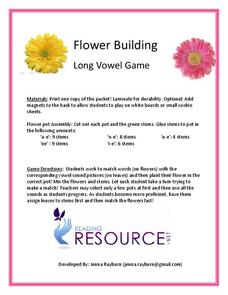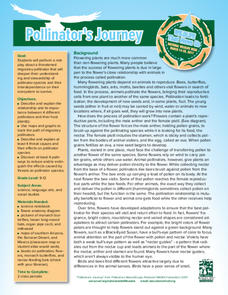Rural Science Education Program
Bees and Flowers – Partners in Pollination
Why are bees so important? After several activities where kids investigate the form and function of flowers, they learn about the different types of bees and label them. They then examine pollen under a microscope and decide which bees...
The New York Times
Trouble in the Hive: Researching the Decimation of Honeybee Colonies
Teach your class about colony collapse disorder and foster discussion about causes and solutions for the honeybee problem. Class members read and discuss an article and participate in one of two detailed activities about pollination and...
National Park Service
Biodiversity—Bee Week
If you want scholars to fall in love with bees, this is the unit for you! Celebrate bees with a full week of material—designed for the Next Generation Science Standards—that addresses the importance of pollination and fertilization....
Rainforest Alliance
Stop and Smell the Flowers
It's a bird! It's a bee! Actually, it's your learners flying from flower to flower smelling their scents! Using paper flowers and essential oils, pupils flutter between flowers to use their sense of smell to experience how animals use...
Curriculum Corner
Bugs and Flowers Math and Literacy Centers
The sun shines, flowers bloom, and bugs fly—it must be Spring! Add a cheerful theme of bugs and flowers to math and literacy centers. Scholars take part in an assortment of activities designed to reinforce concepts such as...
Reading Resource
Flower Building Long Vowel Game
Reading can be as lovely as a walk through the garden! Sets of flowers host words that share long vowel sounds, which kids match to the correct flowerpots.
National Wildlife Federation
Pollinator's Journey: Grades 9-12
Gain a deeper understanding of migratory pollinators. After studying about pollinators and their effects on flowering plants, learners hear a story about the migration of Monarch butterflies and bats in the Sonoma Desert. Small groups...
Core Knowledge Foundation
Plants Tell It Again!™ Read-Aloud Anthology
A 190-page anthology explores the life and parts of plants, flowers, and trees while boosting reading comprehension skills. Literature and informational texts showcase Johnny Appleseed and George Washington Carver. Lessons...
Rain Bird Corporation
Rain Forest Teaching Curriculum
Take young naturalists on an exploration of the world's tropical rainforests with this extensive collection of lessons and activities. Whether its creating leaf and flower prints or investigating the absorption spectrum of...
Education Outside
Honey Tasting
Young scientists will be abuzz as they sample and compare the tasty treats produced by Apis Mellifera.
Agriculture in the Classroom
Pumpkins... Not Just For Halloween
Celebrate fall with four pumpkin themed hands-on activities! After learning about pumpkins, scholars complete two activity sheets that reinforce estimation and word problems. They then plant pumpkin seeds and bake a pie in...
EnLiST
Trap Your Own Insects: What’s in Your Backyard?
Young entomologists construct three types of insect traps—pitfall, pollinator, and panel—before setting their traps out and observing what they caught. They then observe what types of insects the different traps attract.
Other popular searches
- Coevolution Flowers Bees
- Honeybee Flowers
- Co Evolution Flowers Bees
- How Bees Pollinate Flowers
- Flowers and Bees











